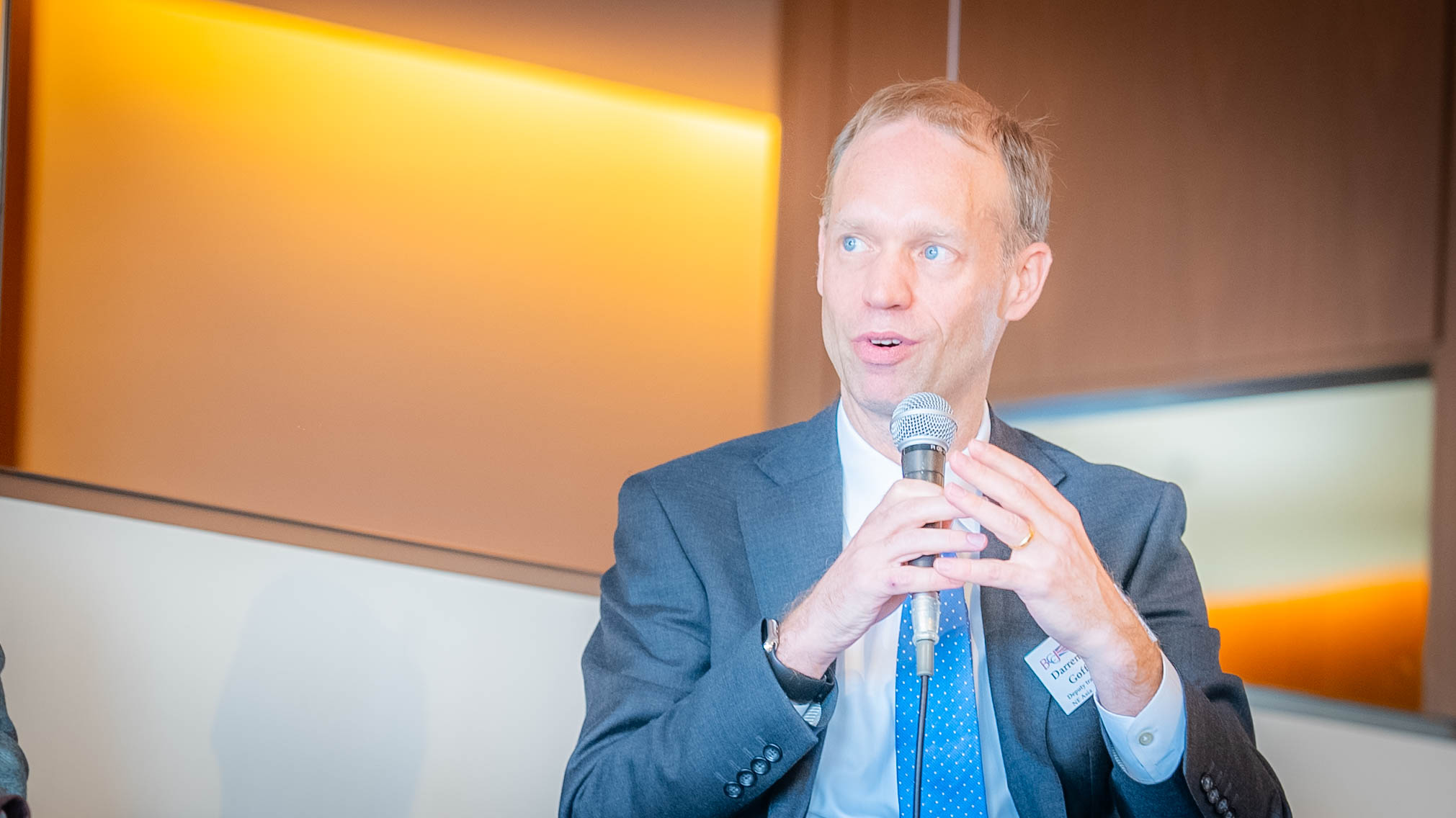Member? Please login
Hiroshima Accord and what it means for UK–Japan relations

Written by Sterling Content
February 2, 2024
Past Event Round Ups
Japan concluded its presidency of the G7 in December, a position that saw the country in the spotlight, but the impact of its activities in 2023 will continue for decades. Last year was an unprecedented period for the UK–Japan relationship, with positive developments in areas ranging from security and energy to business and culture.
The bilateral highlight of 2023 was the signing of the Hiroshima Accord, defined by both nations as “an enhanced UK–Japan global strategic partnership.” The “political document” recognises the UK and Japan as “the closest of partners,” committed to “stand shoulder to shoulder in tackling the unprecedented global challenges we now face.”
In mid-January, the British Chamber of Commerce in Japan held an event about this historic agreement, where British Ambassador to Japan Julia Longbottom CMG addressed members. She was joined in a panel discussion by Margaret Tongue, minister-counsellor for economic diplomacy, and Darren Goff, deputy trade commissioner for North East Asia,
All speakers discussed what the Hiroshima Accord means for the wider UK–Japan relationship and for businesses operating within the bilateral ecosystem, with moderation by BCCJ Vice-president Alison Beale.
Partnership outline
The Hiroshima Accord states that the UK and Japan are connected by their “shared values of freedom, democracy, rule of law, fundamental human rights, and open and fair trade,” adding that these values are “at the heart of our intention to work together for global security, resilience and innovation.”
The document recognises three core principles:
- that security and prosperity of the Euro-Atlantic and Indo-Pacific are inseparable
- that [both countries’] security is built upon the stability, resilience and dynamism of our economies and
- that global challenges can only be addressed through shared action.
Based on these principles, the plan states both countries’ intention
- to strengthen shared security capabilities to help safeguard global peace and stability
- to deepen the bilateral economic relationship to create shared prosperity and increase trade and investment, and
- to lead international efforts to deliver a better and more sustainable future for all.
On security, the accord notes: “Building on recent landmark defence agreements, we commit to closer consultation on security issues, to carry out an ambitious programme of larger and more complex joint exercises and planning, and resolve to bring our defence and security industries closer together.”
It continues: “We will champion a free, fair and resilient rules-based international economic order including through the Comprehensive and Progressive Agreement for Trans-Pacific Partnership (CPTPP) and commit to a closer partnership on challenges to our economic security. As global leaders in science, technology and innovation, we will work together to maintain strategic advantage including in emerging technologies such as AI and quantum … we will establish new partnerships in industrial science, innovation and technology, and in the semiconductor sector.”
Finally, on global challenges, the accord pledges to “strengthen our partnership to enable greater deployment of renewable energy. We will also prioritise actions to tackle climate change, work together to accelerate progress on the Sustainable Development Goals, and improve the effectiveness of multilateral institutions and the international financial system, and take action to tackle the challenges of the international community, including those faced by developing countries.”
G7 and CPTPP
Ambassador Longbottom outlined the extent of the ministerial meetings held across Japan since April 2023, with more than 25 visitors from the senior level of the UK government, many at Cabinet level. Separate bilateral programmes were held, with many addressing the G7 tracks in sector areas as diverse as energy, transport, agriculture, digital technology and trade.

Japan showed “a lot of leadership through its G7 presidency, at a time of global instability,” she said, noting that nearly all of the G7 tracks had a strand on economic security—addressing the disruption to supply chains caused by the war in Ukraine as well as other contingencies—or sustainability.
The G7 was “an opportunity for us to strengthen the UK–Japan partnership,” she said, evidenced by the May 2023 signing of the Hiroshima Accord, which “sets out a really high level of ambition” for the two countries.
While a lot of the content of the agreement reflects bilateral work already being carried out, Longbottom noted the deepening of UK–Japan relationships at government level as well as the impact of soft power in 2023 to put both countries on the map, as demonstrated by the viral social media posts of Prime Minister Rishi Sunak wearing socks adorned with Hiroshima Carp, Prime Minister Fumio Kishida’s local baseball team.
In addition, 2023 saw the UK accede to the CPTPP, in July, and Japan become the first member to ratify its accession, in December. Japan and the UK also signed a number of agreements in relation to space, defence and deepening people-to-people ties.
Business and trade
In another win for UK–Japan relations, leading Japanese businesses last year committed to invest almost £18 billion in business across the UK, generating growth in key sectors, creating high-skilled jobs and driving technology innovation, shared Goff.

Sumitomo Corporation is to expand its UK offshore wind projects while Sumitomo Electric Industries intends to build a cable manufacturing plant, which will also support offshore wind projects. Mitsubishi Estate and Mitsui Fudosan, meanwhile, have confirmed plans to invest into real estate and housing developments, and Toshiba intends to expand its operations at Cambridge Laboratory, which designs quantum-safe cryptographic communication solutions.
British companies are also expanding into Japan. Octopus Energy has committed £1.5 billion of investment in the Asia Pacific, including Japan, and helicopter manufacturer Leonardo UK has signed a £150 million deal with Kawasaki Heavy Industries.
Such developments not only generate employment and economic benefit but also indicate the great potential for UK–Japan relations in the future, said Goff, adding that British and Japanese companies offer a “strong complementarity” in skills.
Tongue pointed out that Japan has expressed interest in talking to the UK about how to promote innovation and startups. Such engagements make is easier to engage with the Japanese government on making a better business environment, too, she said.
The British Embassy team is keen to hear from UK companies in Japan on how the CPTPP could better facilitate trade ahead of the partnership’s review in 2024. Moreover, the British embassy and wider Japan network hopes to create the conditions and introductions to enhance partnerships between British and Japanese companies in key areas, she said.
Looking ahead, the Osaka Expo 2025 presents “another important moment to get the UK’s attention on Japan,” said Longbottom.
The UK Carrier Strike Group is also scheduled to visit Japan as part of its Indo-Pacific deployment in 2025. Its presence is intended to demonstrate the UK’s position as a security ally of Japan while also acting as a platform for business engagement.
In the UK, meanwhile, a roadshow showcasing export opportunities in Asia Pacific markets is scheduled for summer, with embassy staff sharing more details closer to the time.







